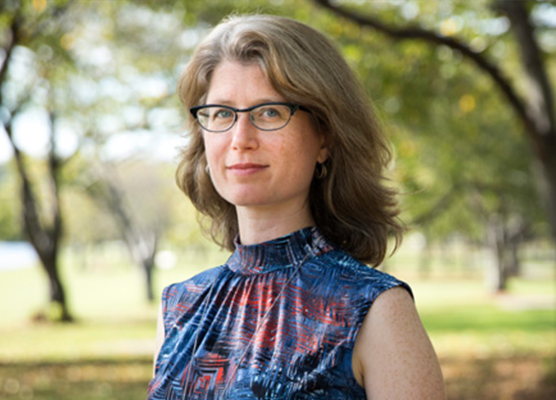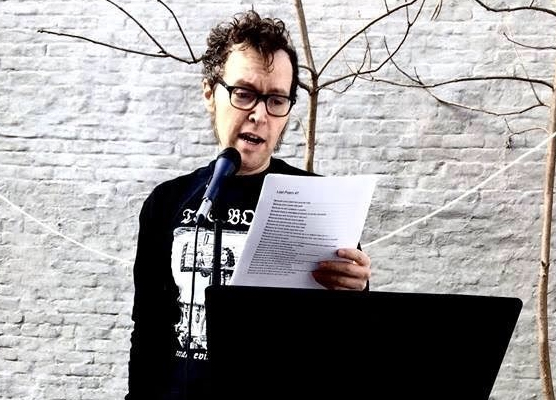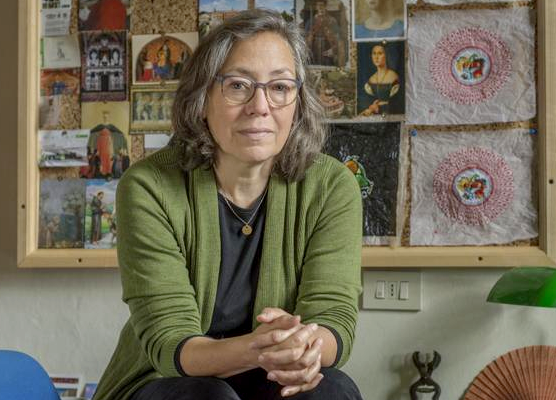
Human beings have a fundamental desire to connect through expression. For both experienced writers and those new to the craft, that desire is often confounded by what's missing: support, structure, and accountability. How many ideas don’t make it to the page for lack of clear guidance or because the competing demands of life and work and family get in the way?
Penn LPS Online’s Certificate in Creative Writing offers a compelling alternative: in these courses, you will find micro-communities designed to suit the talents of all their members, allowing for self-determined pacing and maximum interactive opportunities. Our courses are flexible, generative, and challenging, and are designed to give you the tools you need to create art out of experience. What you learn through our online certificate may inspire you to pursue careers in publishing and the arts, but the lessons extend far beyond the bounds of literary genres. Our workshops produce skilled communicators, critical thinkers, and ardently engaged citizens. At LPS Online, you experience the premier quality instruction that makes the University of Pennsylvania’s writing curriculum so renowned, with a roster of faculty who are actively publishing practitioners in their fields. You’ll also have access to the rich literary community at Penn, including Kelly Writers House, PennSound, Jacket2, and other programs.
To better understand the nature of our courses, and the personal and professional growth they can yield, see what three creative writing faculty members have to say.
Practice flexibility through experimentation and play

Julia Bloch
Faculty Director, Penn LPS Online Certificate in Creative Writing
Director, University of Pennsylvania Creative Writing Program
What do you think is the best way for someone to use a creative writing workshop?
I think the best way to use a creative writing workshop is to play and experiment with as many tools as you have the appetite for. A lot of writers have internalized the idea that the goal of a creative writing workshop is to find your “authentic voice.” And some people might experience that truism as a kind of pressure. As if there's something wrong with you as a writer if you're not always thinking about voice. I like to remind students that there are actually so many more possibilities for what you can do with creative writing. Writing absolutely can be about finding your own voice, but it can also be about discovering the other possibilities of language. Writing can be about exploring historical voices or voices that have been silenced or unheard. Writing can be about the world that surrounds us, or worlds we haven’t yet imagined. Writing can be about experimenting with the very idea of voice in an aesthetically or politically subversive way. Voice is just one part of it all.
I know that you are passionate about editing as well as writing. What is the role of editing in the creative writing process?
I was a copyeditor for many years before I became an academic, so editing holds a special place in my heart. If you're a writer who cares about language, chances are you have an internal editor who shuts things down before you even have a chance to try. It can be a real challenge to push that voice aside and let yourself take risks. But if you can learn to produce writing that isn't quite there yet, you’ll learn to push yourself as a writer and push your work as far as it can go. To me, that's much more interesting than focusing on polish or perfection: the process of writing can be ongoing. When you understand that editing and revising are part of creative practice, there's always somewhere else you can go. Take “Poetry,” by Marianne Moore—she revised that poem for five decades! Everyone who teaches in the Creative Writing Program really believes that craft is an ongoing practice. You try something out, and then you try something different, you try something new. You cultivate an ongoing sense of discovery and play.
How does flexibility factor into the Penn LPS Online Creative Writing curriculum?
Students can focus entirely on one genre, say fiction. Or you can come in and decide you want to try your hand at not only fiction but also poetry, screenwriting, nonfiction, and journalism. You can tailor the program to your interests as a writer. We offer a [range] of topics and activities to suit different kinds of writing habits and practices, from highly collaborative activities to more solitary activities and opportunities to do writing and thinking on your own. Our online courses are designed to fit your schedule and so that you can put into them what you have to give. They’re appropriate for the most gregarious, outgoing students, and for the most introverted students who want to take it slowly and deliberately. That's what I especially love about the online format. You can choose your own adventure with these courses.
Innovative writers are adventurous readers

Jeff T. Johnson
Instructor, Penn LPS Online Certificate in Creative Writing
CRWR 101: The Craft of Creative Writing
What is one piece of advice that you think is appropriate for writers of every level?
If you write or aspire to write, then you have to read as much as you can. Writers who have less experience in having developed their own consistent practice may think that you need to be putting pen to paper or fingers to keyboard for X number of hours a day in order to be a writer. I want to rebut that and suggest that if reading is integral to our writing, then the time you dedicate to your reading practice is part of your writing practice. In addition to reading as much as you can, you have to read as adventurously as you can. You have to read things that are unfamiliar to you and that stoke your curiosity. When writers feel like they’ve hit their limit, often it’s a matter of needing to find something else to read in order to expand their reach of possibilities in that moment.
If you aspire to write and understand that your reading practice is part of that, then you will be not only reading as a writer but also writing as a reader. You will be attending to your audience as you write, even if your audience doesn’t exist yet.
What does it mean to read as a writer?
Part of reading as a writer is giving close attention to the passages that glow, or shine, for you as you read them, and then thinking about why those particular passages are coming alive for you in that moment. Recognizing those vivid, glowing spots can be just as crucial as recognizing the spots that don’t glow: sometimes you can expand your experience by moving through those dark passages as well. You can learn to attune to how you are responding to whatever you are reading and have that guide your exploration. You can step into any library or look at any selection of books or texts and pore your attention over it and see what happens. Follow the lead of your own curiosity.
Are there certain things that make a passage “glow” for you?
I know that I’m always going to be drawn to a text that has interesting rhythms and sounds, a sense of music. That is just as important to me as, say, crystalline images. But I still want to know on a given day where my attention is landing on the page and what comes alive for me as I’m reading. If we’re going to be adventurous readers, we need to want to be surprised. In other words, we need to not know what we’re looking for, so that we can find it. I think of a poem by Allen Ginsberg, “Cosmopolitan Greetings.” It was an occasional piece for a poetry festival, so it’s full of writerly aphorisms and one of them is, “Notice what you notice.” He follows that a couple lines later with “Vividness is self-selecting.” I keep that quote in my back pocket because those moments when you feel surprised as a reader are really ripe moments. I also find that practicing close attention as a reader can make you rethink your approach to language and life and how you think about and encounter the world. It’s enlivening.
Experience creative community and the gift of feedback

Lise Funderburg
Instructor, Penn LPS Online Certificate in Creative Writing
CRWR 360: Advanced Nonfiction
You have taught creative writing workshops in traditional classroom settings and online. What would you say are the differences between the two?
In a traditional workshop, much of its success—meaning, how much students learn and grow, how challenged and satisfied they are by the experience—depends deeply on the creative community that is built. You need to develop camaraderie and respect, trust, and understanding in order to be able to give and receive honest feedback on your creative writing, to get past the mordant fear of exposure. When you’re all in one room, that accelerates interaction. And so, when I was invited to adapt the creative writing workshop that I’ve taught at Penn for many years for the online space, it presented both an opportunity and challenge to create that group-centered experience virtually. With great support from the LPS team, I enlisted technology to create interactive spaces and team exercises, utilizing audio and video resources. I discovered that some of these actually pushed beyond what can happen in a classroom, and they invited students to engage at their own pace, rather than in a set time block. Online students want the community as much as I want them to have community. They get, almost immediately, how useful it is to work in parallel with others, to create a layered conversation about craft; that enthusiasm more than closed the gap of learning in an asynchronous, disbodied classroom.
Can you talk more about the role of feedback in a creative writing workshop?
As writers, we pay such close attention to our work that we can lose perspective on it. One of the best ways to regain a critical distance is to understand how a piece comes across to others, to learn what lands and what doesn’t, what amuses, irritates, transports… and why. You learn where your work resonates with other people and where it confuses them. You might not agree with all the feedback, and you don’t need to, but to be open to it is to engage in possibilities, often ones you couldn’t see on your own. Then, too, the act of articulating a response to someone else's work is of value to any writer. To have to find words to communicate how a piece made you feel, why it confused you, why you loved it, is instructive in itself. And those exchanges fortify the creative community, because most people experience that kind of close attention to their work as a profound gift. To have someone think about your work with you—it feels incredibly affirming to be on the receiving end of that. You have gratitude for it, so you are going to want to reciprocate. You feel a responsibility as well as a desire to give back.
The instructors we spoke to especially encouraged students who are new to creative writing to dive into the practice. They note that it is not uncommon for students to contemplate taking a creative writing workshop for years before actually enrolling. Once they do, they discover that creative writing is both gratifying and liberating. In a world that encourages us to continually finetune and narrow our conceptions of self, the opportunity to invent stories and characters and explore the possibilities of language can unlock powerful growth.
Ready to tap into your creative potential? The Penn LPS Online Certificate in Creative Writing is open for enrollment.
